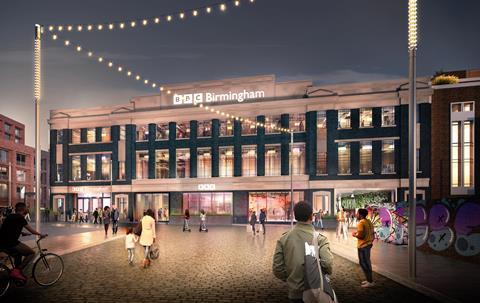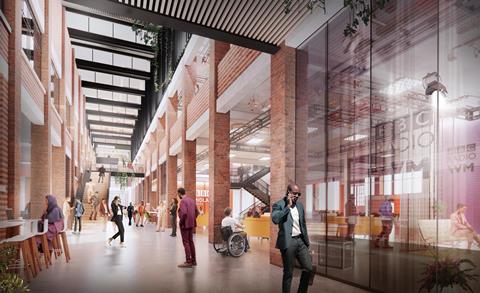Typhoo Tea Factory proposals form part of 4ha masterplan for city’s Digbeth district
Glenn Howells Architects’ proposals to transform Birmingham’s former Typhoo Tea Factory into a new regional hub for the BBC have been submitted for planning.
The scheme is at the centre of transformation plans for a 4ha chunk of the city’s Digbeth district that are being driven by developer Stoford.
Planning consultancy Turley said this week it had lodged a detailed application for the Typhoo Factory proposals with Birmingham City Council, which represented the first phase of the wider area masterplan.

Glenn Howells’ designs for the new BBC base emerged over the summer and were the subject of pre-application consultation events in September.
Stoford director Gerard Ludlow said feedback on the proposals had been “overwhelmingly positive” and demonstrated a genuine excitement about the prospect of the BBC making its home in such a recognisable and prominent building.
“Typhoo Wharf is a significant opportunity, which will not only catalyse reinvigoration of the wider area, but will also help to kickstart further private and public-sector investment into Digbeth’s built environment and transport connections,” he said.
“Central to our Typhoo scheme is the commitment to conserving the historic building, which dates back to 1929 but has been left empty for decades.”

For almost two decades the BBC’s Birmingham operations have been based at Associated Architects’ Mailbox development – a repurposed Post Office building close to the city’s Gas Street basin.
Before that the corporation’s home in the city was the John Madin-designed Pebble Mill Studios in Edgbaston.
Stoford is targeting a 2025 completion for the Typhoo Factory conversion, ahead of BBC staff arriving the following year. The BBC is understood to have agreed a 20-year lease on the building.
Turley said designs for the wider area masterplan were currently being updated following September’s consultation and would be published for further comments “in the coming weeks”.
The Typhoo Tea Factory closed in 1978 and has long been disused. The building fronts Bordesley Street, roughly 200m east of Birmingham’s Selfridges building, built by Laing O’Rourke and designed by Jan Kaplický and Amanda Levete’s Future Systems practice.




















No comments yet